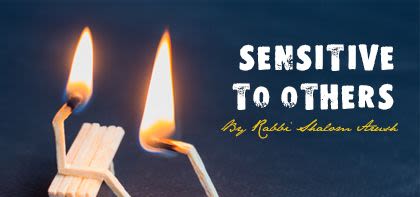
Sensitive to Others
Hashem won't forgive a sin against one's fellow man until the sinner attains the forgiveness of the victim. Unfortunately, most people have extreme difficulty in forgiving…

Suppose that a person has been sinning against Hashem for many years in a row. He has been violating the Sabbath, eating bread on Passover, eating on Yom Kippur and Tisha B’Av and having nothing to do with tefillin, tzitzit or prayer. Yet, with one tiny contemplation of teshuva, or penitence, all his sins are forgiven! Imagine the power of merely contemplating teshuva. The sinner has not yet made one concrete step in correcting himself; he merely thinks, “I haven’t been behaving properly for a long time. I’m sorry about that; from this day on, I want to better my ways and heed Hashem’s commandments.”
This mere contemplation of teshuva contains the four vital elements of teshuva: confession, remorse for past actions, cessation of the bad behavior and resolution to improve. With one positive thought, all his sins are erased and a person attains the status of a tzaddik, as the Gemara teaches us. That’s why we say in the Amida prayer, “Blessed are You, Hashem…the compassionate One Who is lavishly forgiving.” Hashem makes it easy for us to make amends with Him, for He is so very forgiving. It’s enough that a person merely contemplate teshuva, and Hashem already forgives him and takes him back with open arms.
Transgressions between man and fellow man are a whole different story. Hashem won’t forgive until the sinning aggressor attained the forgiveness of the victim. Unfortunately, most people have extreme difficulty in forgiving. Only if they are completely healthy from an emotional standpoint will they be quick  to forgive, even without the aggressor asking for forgiveness. Even so, the aggressor must ask for forgiveness and the victim must respond explicitly out loud, “I hereby forgive.”
to forgive, even without the aggressor asking for forgiveness. Even so, the aggressor must ask for forgiveness and the victim must respond explicitly out loud, “I hereby forgive.”
Reality shows that most people are highly sensitive, due to things they’ve experienced in their past, especially during their formative years. Perhaps they experienced a trauma or had critical parents who failed to consider their feelings and constantly hurt them. There are reasons why people are sensitive, vulnerable and frequently unforgiving. Therefore, one must exercise extreme caution in avoiding anything that might be hurtful to another person. If someone has already hurt someone else, he should make every effort to seek that person’s forgiveness, and not be lazy about apologizing.
We must all be aware that the main reason for the continuation of the Diaspora and exile of the Jewish People is the sins between man and fellow man! In the Egyptian exile, as soon as the Jewish People began to heed each other’s cries of anguish, Hashem redeemed them. People are mistaken in thinking that the exile is perpetuated because of a lack of Sabbath observance or a lack of modesty. True, Sabbath observance and modesty are critically important for the Jewish People. Nevertheless, the most critical factor that determines our national destiny is how we treat our fellow man.
With thanks to Hashem, there is constant improvement in mitzvah observance among the Jewish People in Israel. I frequently travel all over our country from north to south, from Dan to Eilat. Auditoriums are packed with people who want to learn more about emuna and to get closer to Hashem. Emuna is spreading all over the globe. Yet, relationships between man and fellow man must still be improved and rectified. Even those who have come back to Hashem and have strengthened themselves in Torah learning and mitzvah observance don’t yet realize that our main focus should be on improving our relationships with others; that’s our prime task right now.











Tell us what you think!
Thank you for your comment!
It will be published after approval by the Editor.